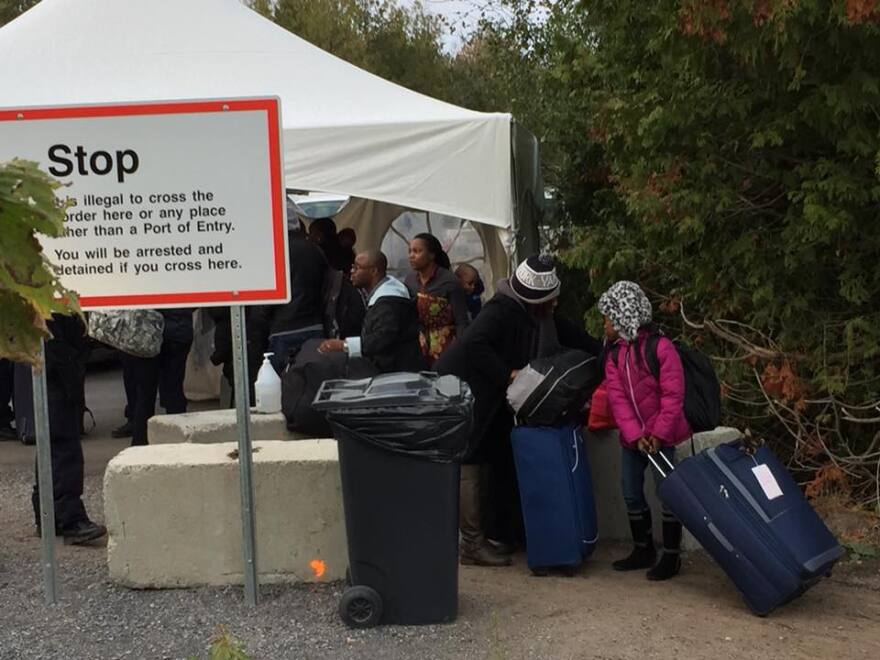Since Donald Trump became president and announced his immigration and refugee policies, thousands have been finding their way to Roxham Road in Champlain, New York to cross into Canada. Even in frigid weather, the stream of people hasn’t stopped. Volunteers on both sides of the border are offering help and reassurance.
Volunteers at Roxham Road: “Do you understand what’s happening? So you know? Okay. Can you see if you can find her come gloves, Wendy? It’s so cold.”
There is no brick and mortar border crossing facility where Roxham Road ends at the Canadian border. Even though it’s mid-winter, taxis still arrive daily with people intent on crossing into Canada at the end of this road in Champlain, New York. They are greeted by volunteers who distribute water and snacks in the summer and coats, hats and mittens in the winter.
Plattsburgh Cares Executive Committee member Janet McFetridge lives about three miles from Roxham Road and began helping people last February before the group formed. “In the summertime I also went up to pick up the litter that was on the road because there were so many people crossing in the summer, particularly in August it was over 5,000, there was a lot of trash on the road. And in picking that up there was also some interesting documentation that told a little bit of the story of where these people were coming from. You know I would pick up bus tickets or plane tickets, I.D. cards, cut up credit cards, pictures and it would tell a little bit about people coming through. They each have their individual story. Many of them are families. They’re coming from all over the country to get to this spot and they are originally from all around the world.”
Plattsburgh Cares began working with Canadian counterparts last September. Bridges Not Borders volunteer Wendy Ayotte says the site is popular because it’s perceived as safe. "Roxham Road is ah the border crossing is just a little ditch. So it’s actually a safe place where they can cross over from the road on the U.S. side to the road on the Canadian side. And before there was an RCMP installation put up in Roxham Road it was wide open. So I think the attraction was the simplicity of the crossing.”
As the influx of people illegally crossing at the end of the rural road into Canada grew over the past year, the Royal Canadian Mountain police set up a tent, then a trailer, to process the new immigrants. McFetridge says she has also noticed asylum seekers have more awareness of the process now. “Early on people were not very well informed. They would climb out of a taxi and some of them said to me ‘Do I have to run?’ ‘Are they going to pull out a gun?’ I mean they were truly terrified of doing something that they felt could harm them but they felt that they had to do. Now however most of them are quite well informed. There are YouTube videos that they watch that detail exactly what’s going to happen. Some of the taxi drivers will explain that they’re going to cross a short trail but they will be arrested. However there are still some that arrive that have absolutely no idea of what to do. They climb out and they look around very confused.”
Ayotte, who lives in Canada, explains what will happen to a refugee when they cross the border. “The first important thing is that they will be arrested and they should cooperate entirely with the RCMP. The second thing is is that as an asylum seeker your claim for asylum will be based on your refugee story. Why are you afraid to return to your country of origin? What are the specific incidents? What happened to you or your family members that make you afraid to return back to your country of origin? It’s important that you have those details clear in your mind. Write them down. If you have any supporting documentation, you know newspaper coverage anything like that, that you can bring with you to support the claim for asylum that you’re going to make in Canada.”
Ayotte and McFetridge report that nearly 50 people a day continue to cross the border at Roxham Road.



